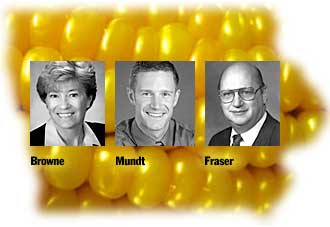Shared news sked will debut on Iowa network in January
Iowa Public Radio will take a leap in its evolution into a statewide network Jan. 1 with the launch of a uniform news/talk schedule on 10 of its stations.
It’s the network’s first step toward streamlined operations that will eventually result in three shared programming streams on its 14 stations. Classical music is slated for a similar overhaul next summer, and a Triple A format is in the works.
The stations, newly combined into a state network, will stick with their current formats, but the news stations will share a version of Morning Edition originating from WSUI-AM/KSUI-FM in Iowa City and one of All Things Considered from KUNI-FM/KHKE-FM in Cedar Falls. The network chose the originating newsrooms with the strongest hosts.
The new arrangement eliminates duplicated hosting jobs and frees some staffers to work as producers and reporters. The stations will also air a 10 a.m. statewide talk show produced in Iowa City, and WOI-AM in Ames, whose signal covers much of the state, will produce and broadcast two talk shows, one focusing in part on farming news.
Economies of scale are what Iowa’s Board of Regents had in mind when it called for the creation of IPR in December 2004. The new network corrals stations licensed to three universities under the board’s control: Iowa State University in Ames, the University of Iowa in Iowa City and the University of Northern Iowa in Cedar Falls.
IPR, a nonprofit incorporated Feb. 1, operates the stations through local management agreements with the universities, which retain the licenses. The new network employs about 50 staffers and commands an annual budget of $6.3 million, making it one of public radio’s bigger entities.
As network execs have found, listeners are eager for it to fill those big shoes. “They already see us as a network,” says Cindy Browne, who began as IPR’s executive director Sept. 1, 2005. “We’re kind of growing into that role.” Though the network has yet to consolidate fundraising, its stations are already receiving checks made out to Iowa Public Radio, Browne says.
Browne’s listeners also hunger for a radio net that serves their strong identity as Iowans. Ask natives where they’re from, and before naming their hometowns, they’re likely to say simply “Iowa.”
“Local news is Iowa news,” says Todd Mundt, IPR’s director of content and media since the summer and a native of Boone, Iowa, who returned to his home state after a sojourn at Michigan Public Media.
Once upon a time, the Des Moines Register was the statewide voice and landed on doorsteps from Sioux City to Davenport every morning. But the paper contracted its distribution and news coverage after it was sold to Gannett in 1985.
When Browne came to Iowa from her longtime home in Minnesota’s Twin Cities, many Iowans told her about the Register’s decline, infusing the tale with strong emotion. So she was surprised to learn that the paper was sold two decades ago.
“When people miss something for [that many] years, there’s some real value to be created in responding to that need,” Browne says. “Everyone seems to think we’re the ones that can even consider trying to step into that role, and they’re very encouraging.”
“We know we’re never going to have a news team the size of the Des Moines Register’s,” Mundt adds. “But the key is providing that connection and discussion point for people all around Iowa.”
When the network consolidates classical music programming, it will have locally hosted music while importing a national service, probably for overnight hours, Mundt says. The Triple A format will build on KUNI’s part-time music programming, but Mundt is unsure where it will air. IPR will probably stream it online and may also use it for digital multicast channels.
As with news, the network expects to eliminate duplicative production but decentralize the work among the network’s facilities. That model of using the network’s stations as production hubs will probably remain in effect for at least five years, Mundt and Browne say.
Over time, however, programming might be centralized in Des Moines, where IPR is looking for permanent offices. Browne now works from her home in the city, while Mundt logs most of his office time at the Mars Cafe near the campus of Drake University.
Other changes to come include consolidating fundraising, a job that falls to Development Director Robin Fraser, who joined the network last month after leading the Mercy Healthcare Foundation in Clinton, Iowa, for 16 years.
The stations now raise funds separately, but Browne hopes their efforts will begin to come together next spring. IPR hopes to rely less on funding from its university licensees but also strengthen its relationships with the schools.
Web page
posted Dec. 5, 2006
Copyright 2006 by Current Publishing Committee
